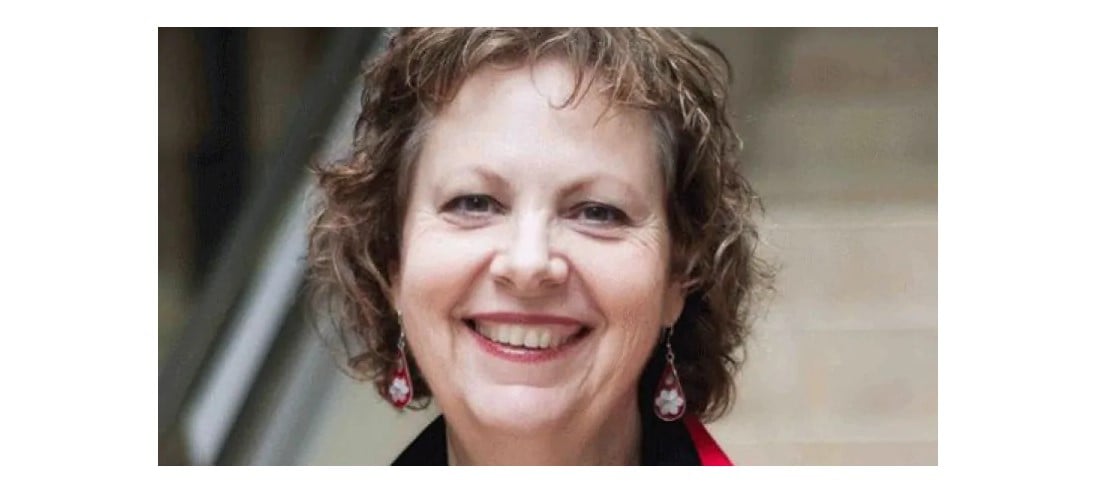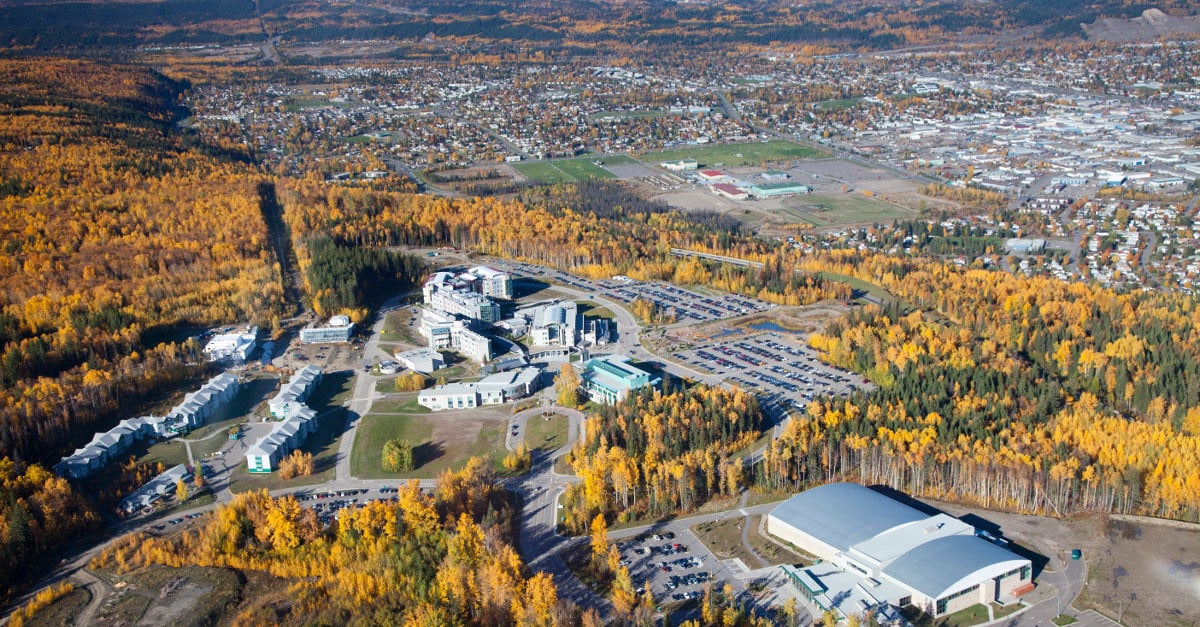In an address to peers last year, a senior administrator involved with the ongoing faculty strike at the University of Northern British Columbia described the challenges of running a university in the north as “pretty scary stuff” and alluded to a 10-year plan to shut down the institution.
“Universities don’t typically die, but there’s always a first,” says Barb Daigle, UNBC’s interim vice-president of finance, people, organizational design and risk, during a presentation called “Leading from the Middle” that she gave at the Canadian Association of University Business Officers conference in Vancouver in June 2018. The talk was recorded and posted to the CAUBO website and linked to in this story, but has since been taken down. A cached version of the video is here.
“We have all these wakeup calls that would indicate UNBC’s in trouble,” she says 27 minutes into the talk. “We were at the beginning of developing the 10-year plan to shut UNBC down, because we had some significant issues that needed to turn around and budget, certainly, was one of them.”
In the talk, Daigle, the university’s chief negotiator, describes an initial period of growth for UNBC, which opened in the early 1990s, followed by a plateau. In recent years, she describes a time of “chaos” marked by a strike in 2015, declining enrolment and budget deficits.
“Have we re-emerged yet? I don’t think so. It’s a journey, right. But I think we’re no longer on that journey down towards death. That’s pretty scary,” she says.
UNBC is nearly two weeks into a strike that has suspended classes at the Prince George campus. An ongoing issue is instructor salaries, which faculty association president Stephen Rader describes as “way off the bottom of the chart.”
While the university offers competitive wages to start in an effort to attract faculty to the northern community, he says that annual increases lag far behind comparable universities. According to Rader, similar institutions increase salaries between $2,500 and $4,000 per year. At UNBC, salaries increase at $1,100 per year.
“The fundamental problem is that, since the university started, our annual increases have been so low that once you’ve been working at UNBC for a few years, you’ve fallen way behind comparators at other universities,” Rader said.
Salaries were at the heart of the university’s 2015 strike, which lasted two weeks and ended with forced arbitration. A committee formed to examine the salary structure released a report last year saying UNBC should aim to pay the same as the median salary at comparable universities, Rader says.
He was optimistic that, going into the recent round of bargaining, they would come to a quick agreement.
“When we actually started bargaining, it turned out that the administration wanted to get a bunch of concessions from us in exchange for fixing this problem. That was where they lost us,” he says.
Daigle came to UNBC in 2015 after 12 years at the University of Saskatchewan.
Following a month-long strike at the Saskatoon university in 2007, the Canadian Union of Public Employees filed three unfair labour practice complaints with the Saskatchewan Labour Relations Board.
They accused Daigle, then chief negotiator for the administration, of refusing to take a tentative agreement to the university’s board of governors if a union representative participated in a news conference. At the conference, faculty, staff and students were to call for an external review of labour relations.
Daigle left in July 2014 following the high-profile dismissal of professor Robert Buckingham, who was escorted off campus in May of that year after publishing a letter called “The Silence of the Deans” that criticized the administration’s restructuring and budget cuts known as TransformUS.
Buckingham was quickly re-instated, but the controversy resulted in the resignation of provost Brett Fairbairn and dismissal of president Ilene Busch-Vishniac. Daigle, who was an associate vice president at the university, stepped down shortly after.

Daigle was hired at UNBC in May 2015, two months after the resolution of its last strike. In a phone interview Tuesday, she denied there was ever discussion around shutting down the university.
“I can’t imagine I would have said we were ever going to shut down the university. My focus would have been, if we don’t recognize the warning signs — as we are recognizing them and taking appropriate action — then, really, 10 years from now we’re not going to have much of a university left,” she said.
“We were not in that place then, we are not in that place now. Our future is positive. As long as we pay attention to these things.”
Paul Orlowski has been at the University of Saskatchewan for 10 years and witnessed the debacle around TransformUS, a program that was cancelled shortly after Daigle’s departure.
As an associate professor in the department of education, he has studied the effects of a neoliberal agenda on Canadian universities and sees a trend toward postsecondary institutions hiring anti-union administrators who look to run universities like businesses.
“That is what’s happening in the neoliberal era with universities,” he says. “Here on the prairies, in particular, where I’ve been for the last decade, people are voting for tax cuts.” As a result, “the government has not quite enough money even for the commons, including their public universities, which are part of the commons.”
A decline in government funding of universities in recent decades has led to research that’s increasingly funded by a corporate agenda and the loss of academic freedom, Orlowski says. He adds that tenures, which provide job security to university professors, have been under attack since the 1980s.
“The student gets a worse education,” he says. “It’s not just at U Sask. It’s across Canada and probably the States.”
As the only university in the northern half of the province, UNBC not only provides an option for students close to home, but is a source of pride for those living in the region. The university regularly lands on the list of B.C.’s top 100 employers and has consistently been ranked top three in its category in Maclean’s magazine’s annual university rankings for over a decade.
Heather Sapergia is a Prince George resident who advocated for the university’s creation in the late 1980s and has continued to be part of the UNBC community, with her daughter completing a course there and two nieces and a son-in-law graduating with degrees.
She completed her own degree, in psychology, at UNBC in 1996 at 46. The year she started, the average student age was 44 — a testament to the number of local residents jumping at the opportunity to finish their degrees locally.
“To me, UNBC is an essential part of our community,” she says. “To even contemplate shutting that down, it would be a huge hit on the culture and the economy of the area. The grads that are coming out of UNBC are an essential part of our community. The university is integral in the community and not just Prince George, but surrounding communities as well.”
Ultimately, it’s the students who are most affected by the strike.
“I think everyone is very frustrated at this point,” says Matilda McGirr, who is in her fourth year of bio chemistry at UNBC. “I’m hoping to graduate, but we don’t know if that will be possible now.”
McGirr is from Williams Lake, 240 kilometres south of Prince George. The opportunity to pursue undergrad research at a university close to home was a deciding factor in her going to UNBC.
“It was probably the main factor for me choosing UNBC, was that it was close. Most of my peers are from northern B.C. I’m one of the southernmost people. I think it’s the access, for most people, to university. It’s pretty important and, up until this point, it’s seemed like a fantastic university.”
But the strike, the second in five years, has some of her peers reconsidering whether they’ll continue.
“There are a couple students I know who are in their fourth year who are hoping to start their master’s at UNBC next year and now they’re reconsidering,” she says.
The university issued an update at press time Wednesday saying it was still reviewing a proposal submitted by faculty on Monday. Rader describes the university’s proposal as an experimental “made for UNBC solution” to the collective agreement not seen elsewhere in the country.
“[Daigle] thinks universities need to be run like a business, that the important thing is to have as much management control as possible,” he says. “Instead of viewing them as a public good, there to support society by teaching students how to be better citizens and providing them skills, they view it in a much more transactional way.”
But ultimately, for Rader, it’s the flippancy of Daigle’s comments at the CAUBO conference that rankle.
“It seems incredibly irresponsible to go to a public meeting that’s being recorded and put on the Internet and say, we have a plan to shut this place down,” he says, adding that the comments could impact enrolment and funding.
“It’s a self-fulfilling prophecy,” he says. ![]()
Read more: Education, Labour + Industry
















Tyee Commenting Guidelines
Comments that violate guidelines risk being deleted, and violations may result in a temporary or permanent user ban. Maintain the spirit of good conversation to stay in the discussion.
*Please note The Tyee is not a forum for spreading misinformation about COVID-19, denying its existence or minimizing its risk to public health.
Do:
Do not: